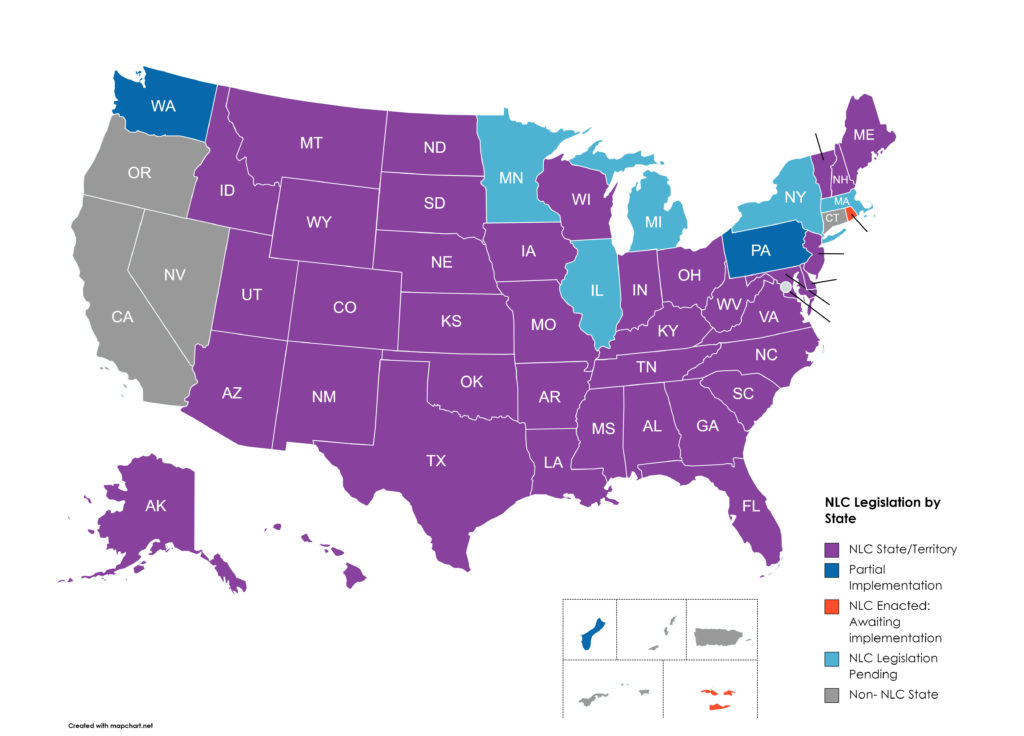Are you an RN or LPN who wants to transfer your nursing license to a new state? Whether you are looking to make a permanent move, or just work as a travel nurse, we will go over the different ways you might transfer your license and some of the things to expect while on your journey! While the requirements in each state vary, most states will be looking for you to have the same basic bases covered for your initial licensure. Have you graduated from an accredited Nursing Program? Have you passed your NCLEX-RN Exam? And, have you passed the required state background checks and screenings?
If you have already managed to do these three things, the next steps to transfer your nursing license might actually be easier than you think! To be certain of what you will need to transfer your license to your new destination, be sure to check out the Board of Nursing’s website to see what each state requires. If you are going from a compact state to another compact state, you will most likely just have some paperwork to fill out and maybe a small fee depending on the state.
Table of Contents
What is a compact nursing State?
A compact nursing state, also known as the Nurse Licensure Compact (NLC), is an agreement among certain U.S. states and territories that allows registered nurses (RNs) and licensed practical/vocational nurses (LPN/VNs) to hold a single multistate nursing license, granting them the privilege to practice in their home state as well as other compact states. The NLC aims to facilitate nursing mobility across state borders, streamlining the process for nurses to practice in multiple states without needing additional licenses. Nurses in compact states must adhere to the laws and regulations of the state in which they are practicing, even if they differ from their home state’s laws.
Most US states are NLC states with only a few that are Non-NLC. As of October 2023, 41 states and territories have NLC legislation fully or partially implemented, or are awaiting implementation of legislation.

What Happens When I Transfer My License?
If you do want to transfer your nursing license, a good place to start is getting all of your ducks in a row. The fastest and easiest way to do this is to simply reach out to the Licensing Board of the state you currently practice in and request verification or certification of the license that you hold.
After you have all the documents you need; you can go to the Board of Nursing website for the state you’re interested in and begin applying for licensure by endorsement. Once you become approved in the new state, your old license will be invalid and a new one will be issued to you.
Transferring A License to Another Country
In order to transfer your nursing license to another country can present several hurdles and challenges. While Australia, Denmark, and New Zealand accept licensure from the US and offer a fairly straightforward process for getting your license transferred; each country has its own set of regulations, requirements, and procedures for foreign-trained nurses seeking licensure.
Language proficiency tests, additional education or training, and rigorous examinations specific to the healthcare system of the destination country are often mandatory. Credential evaluations to ensure equivalency to local standards, visa and work permit processes, and potentially lengthy bureaucratic procedures can further complicate the transfer. Adapting to cultural differences, variations in nursing practices, and potential differences in healthcare infrastructure may also pose challenges.
The complexity of international credentialing, coupled with diverse regulatory frameworks and cultural adjustments, makes it harder to transfer your nursing license. Transferring a nursing license to another country is a demanding and multi-faceted endeavor requiring thorough research and preparation. If this is a path you are looking into, make sure you do plenty of homework ahead of time to ensure your transition into the new role is as seamless as possible.

4 Common Ways to Transfer Your Nursing License
Compact to Compact
Since most states are Compact states, this transfer type is typically the most common. Transferring your license from one compact state to another typically involves a streamlined process called “mutual recognition” or “nurse licensure compact privilege.” Nurses with an active, unencumbered license from their home compact state can practice in another compact state without needing an additional license. They can simply work under the “multistate privilege” in the new compact state as long as they adhere to the regulations and laws of that state while practicing
Compact to Non-compact
Transferring your nursing license from a compact to a non-compact state often involves applying for licensure by endorsement in the new non-compact state. Nurses must submit documentation including education verification, exam scores (such as the NCLEX-RN), background checks, and fulfill any additional requirements specified by the non-compact state’s nursing board for obtaining a license to practice within that state.
Non-compact to Compact
To transfer your nursing license from a non-compact state to a compact state involves a process known as “conversion” rather than reciprocity. Nurses from non-compact states can apply for a single-state license in the compact state where they wish to practice. They’ll need to meet the requirements set by the new state’s nursing board, which typically includes submitting documentation such as education verification, passing exam scores (like the NCLEX-RN), background checks, and any additional state-specific prerequisites for licensure. Once approved, they can practice in that specific compact state under its regulations.
Non-compact to Non-compact
To transfer your nursing license from a non-compact state to another non-compact state typically involves applying for licensure by endorsement in the new state. This process usually requires submitting documentation such as proof of education, passing exam scores (like the NCLEX-RN), background checks, and sometimes additional state-specific requirements. The specific steps and documentation needed may vary between states, often necessitating a careful review of the new state’s nursing board guidelines to ensure a smooth transfer of licensure.


